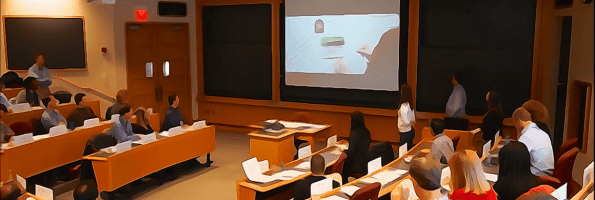Starting a Business Straight Out of School? How HBS Supports Student Entrepreneurship

This coming weekend, Harvard Business School (HBS) will host an annual Entrepreneurship Conference sponsored by its own homegrown Entrepreneurship Club. The conference brings together hundreds of participants including “founders, joiners, and venture capitalists,” all of whom hope to connect through a smorgasbord of lectures, panels, chats, and networking sessions.
This year’s conference, scheduled for Saturday, March 31, is expected to draw more than 500 participants, including many top professors and professionals holding court on a variety of topics. Three keynote lectures will be given by CEOs and founders from Catalant Technologies, Strava, and edX. Strava’s Michael Horvath, who is also a professor of entrepreneurship at Dartmouth’s Tuck School of Business, will share his experiences having held several high-level roles at multiple startups.

Tuck Professor and Strava Co-Founder Michael Horvath will give one of the Entrepreneurship Conference’s keynote addresses.
In addition to the keynote lectures, the conference is also stacked with nine different panels. Some will include general discussions on topics such as starting a business during your MBA program and financing your startup. Others are more specific, covering some of the hottest fields in entrepreneurship right now. Examples of these include “Blockchain: The Next Transformative Technology?” and “AI/ML: Artificial Intelligence in Diverse Contexts.” Finally, attendees will also get to take part in a venture capitalist meet-and-greet and a networking lunch and cocktail hour.
HBS is extremely supportive of entrepreneurship, according to Jim Aisner, the school’s director of media and public relations. He spoke at length about the myriad ways in which HBS is a fantastic place for both seasoned and budding entrepreneurs, underscoring the range of support Harvard’s large entrepreneurial community offers to those looking to start their own businesses.
“Entrepreneurship is a major component of life at HBS, with some 35 faculty members doing research, course development, mentoring/advising, and teaching in this area,” Aisner told Clear Admit.
Harvard’s program requires all first-year MBA students to take an entrepreneurship course, and there are also a large number of entrepreneurial-focused electives on offer in the second-year Elective Curriculum. In addition, the school boasts multiple conferences and events that reach programs outside the business school. “There is a whole ecosystem [at Harvard] promoting and nurturing entrepreneurship,” Aisner notes.
Significant Programming Supports HBS Student Entrepreneurs
HBS is also home to the Arthur Rock Center Accelerator, which helps selected teams develop their ventures over the course of the year. In addition, the Rock Accelerator offers summer fellowships to support students from the entire student body who seek to develop entrepreneurial ventures during the summer and hosts a semiannual conference that brings 100 alumni back to campus each year.
Rock Venture Partners is a program that lets small groups of students learn more about investing in startups by supporting Rock Accelerator teams as they go through pitching and starting their ventures. Then there is the Harvard Innovation Lab, or i-lab, a resource available to current students at any Harvard school interested in exploring innovation and entrepreneurship at any stage. “The Innovation Lab creates a hotbed of cross fertilization for teams from across the university,” says Aisner.
Given this supportive environment, it won’t come as a shock that many HBS students decide to start their own businesses rather than pursue a more traditional career path in their post-MBA life. Out of more than 900 students, eight percent of graduates from the Class of 2017 chose to start their own businesses upon graduation, up from six percent in the Class of 2016. Although this growth is indicative of a national trend toward more and more recent MBA grads founding startups, HBS outperforms many top schools in this regard. By comparison, at Chicago Booth just 3.2 percent of 2017 MBA grads went immediately into running their own startups. Meanwhile, at the University of Pennsylvania’s Wharton School, just 2.3 percent of the most recent graduating class founded businesses.
As another indicator of its commitment to fostering entrepreneurship, HBS will host its annual New Venture Competition on April 18th, which bestows more than $300,000 in prize money to outstanding new ventures. Contestants may apply in either the business track, with ventures that drive substantial market value, or the social enterprise track, with ventures that drive social change. This recent Clear Admit article noted that the social enterprise track received 69 entries this year, more than ever before.
Nationwide, more and more students have begun to pursue startups at all stages of their MBA careers. From this weekend’s student-led Entrepreneurship Conference to the wide range of related centers, faculty, and other support, HBS’s investment in nurturing its entrepreneurial students is clear.
This article has been edited and republished with permissions from our sister site, Clear Admit.
The Future of Employment at Philly Business Schools

When considering where to get your MBA, one of the first questions you should ask is, “What will my employment outlook be?” After all, the reason you get an MBA is to improve your career. But what is important when it comes to employment trends at the leading business schools in Philadelphia? There are quite a few different statistics you should look at.
Important MBA Employment Statistics
To choose an MBA program based on your future career success, there are a few questions you need to answer.
- What industry do I want to work in and does the school place a majority of their students in that industry?
- What percentage of students receive and accept job offers? The same for internships?
- Self-employed or entrepreneurship data?
- What salary can I expect?
- Where do most students end up living and work?
- Who are the top employers?
You also want to look at any trends between years. For example, the percentage of students receiving job offers should increase year-over-year. And if you see a shift from the consulting industry to financial services, you want to be aware that the school could be changing its direction.
So, what does employment look like for three of the top Philly business schools?
The Wharton School
At the Wharton School at the University of Pennsylvania, the employment trends year-over-year are fairly consistent. While the percentage of students reporting job offers dropped from 2016 to 2017, part of that reason may be the increased number of students seeking employment (75.2 percent vs. 79.1 percent).
As for the increase in median salary, that can be attributed to inflation as well as an increase in job salary for each industry including professional services rising from $160,000 in 2016 to $180,000 in 2017. The location of jobs also changed slightly between 2016 and 2017, but that could be due to various reasons including the current state of international affairs for the U.S.
| The Wharton School | 2017 | 2016 |
|---|---|---|
| Percentage of students reporting job offers | 97.1 percent | 98.3 percent |
| Percentage of self-employed students or those starting their own business | 4.8 percent | 5.8 percent |
| Median Salary | $130,000 | $125,000 |
| Location Choices | 88.7 percent U.S. 11.3 percent International | 86.9 percent U.S. 13.1 percent International |
As for where MBA students at the Wharton School gain employment, there are a few important notes. The same top three industries—financial services, consulting, and technology—attracted students in both 2016 and 2017. However, the percentages were a little more evenly distributed in 2017. As for the companies hiring students, most of the same companies showed up each year.
| Top Three Industries | Percentage of Students (2017) | Percentage of Students (2016) | Companies Employing Two or More Students (2017) |
|---|---|---|---|
| Financial Services | 32.7 percent | 35.1 percent | Barclays, CITI, and HSBC |
| Consulting | 28.3 percent | 26.6 percent | A.T. Kearney, McKinsey & Company, and Boston Consulting Group |
| Technology | 16 percent | 12.6 percent | Adobe Systems, Amazon, and IBM |
Penn State Smeal College of Business
Pen State’s Smeal College of Business is consistent year-over-year in regards to its MBA employment trends. The percentage of student reporting and accepting job offers increased between 2016 and 2017 from 88.9 percent to 91.5 percent. However, the median salary stayed consistent at $105,000, and the hiring trend of most MBA students staying in the U.S. also remained the same.
| Penn State Smeal College of Business | 2017 | 2016 |
|---|---|---|
| Percentage of Students Reporting Job Offers | 91.5 percent | 88.9 percent |
| Median Salary | $105,000 | $105,000 |
| Location(s) | 98 percent U.S. 2 percent International | 96.5 percent U.S. 3.5 percent International |
As for where MBA students at Smeal College gain employment, there are a few important notes. While the same industries made the top four each year, where they placed changed. In 2016, the top industry was consulting (25 percent) while that changed to manufacturing in 2017 (20 percent). In 2017, retail also moved into tie consulting for the second most sought-after industry, while technology actually decreased year-over-year (23 percent vs. 15 percent).
| Top Four Industries | Percentage of Students (2017) | Percentage of Students (2016) | Companies Hiring |
|---|---|---|---|
| Consutling | 18.5 percent | 25 percent | Deloitte, EY, and PricewaterhouseCoopers |
| Technology | 15 percent | 23 percent | Amazon, Apple, and Dell |
| Manufacturing | 20 percent | 14 percent | Amphenol Corp, CHEP, International Inc. |
| Retail | 18.5 percent | 14 percent | Anheuser-Busch, Proctor & Gamble, and Johnson & Johnson |
Rutgers Business School, Camden
In 2017, the Financial Times ranked the Rutgers MBA as the best program for MBA employment across Big 10 schools. In 2016, Bloomberg Businessweek also ranked Rutgers as the best MBA program for job placement in the U.S. This indicates a relatively steady year-over-year employment trend for MBA students.
As for the median salary of a Rutgers MBA, students in 2017 could expect to earn $95,680. As for the most popular industries, they were:
- Pharmaceutical/Biotech/Healthcare: 46 percent
- Consulting: 13 percent
- Consumer Products: 13 percent
- Other: 14 percent
U.S. News Reveals Sneak Peek of Its 2019 Business School Rankings

With just over a week before U.S. News & World Report reveals its eagerly-anticipated 2019 best business school rankings, the publication offered a sneak peek of the business schools that managed to earn spots within the top 10.
Unsurprisingly, the top 10 of the 2019 rankings resembles the publication’s 2018 edition, with nine out of the top 10 schools nearing the top of the annual list. The lone ranking variation from 2018 to 2019 will be the University of Michigan Stephen M. Ross School of Business, which came in 11th in the previous year.
The top ten business schools for the 2019 U.S. News rankings are as follows (unordered):
- The Wharton School at the University of Pennsylvania
- Harvard Business School
- The Booth School of Business at the University of Chicago
- The Kellogg School of Management at Northwestern University
- The Ross School of Business at the University of Michigan
- The Tuck School of Business at Dartmouth University
- The Sloan School of Management at MIT
- The Stanford Graduate School of Business
- University of California—Berkeley (Haas)
The one school left out of the newest rankings from the previous edition was the Yale School of Management.
The publication will release the full list of the 2019 best business school rankings will officially arrive on March 20, 2018. Stay tuned for more updates on the rankings on MetroMBA.
Our 5 Favorite MBA Podcasts Right Now

Clear Admit recently looked into some of the best business school podcasts out today. Take a look at a few of the premiere productions below.
Many business schools and MBA students have recently begun to produce podcasts, discussing the diverse range of student and graduate experiences as well as current trends and relevant topics in business. These podcasts are unique in that they provide a candid, first-person look at business school from those currently enrolled, allowing for an open platform to discuss business topics outside of the confines of the university. While this is a fairly new trend, there are several different podcasts out there for those who might be interested to learn more. We’ve assembled our five favorite MBA podcasts right now, and we’ll keep an eye out for new podcasts to highlight going forward.
Business Beyond Usual, by Ross Business School Students
One very cool MBA podcast on our radar is Business Beyond Usual, produced by students at the University of Michigan’s Ross School of Business. The podcast tackles a variety of issues of interest to both prospective and current business school students. Recent episodes have delved into topics including:
- Is business education a waste of money?
- Do school rankings actually mean anything?
- If you want to make a difference in the world, is working for a consulting firm selling out?
The podcast describes itself as having no rules or moderators, so those looking for an unfiltered opinion on the MBA experience may be interested in what these Michigan students are doing. With more than 20 episodes in the series already, there’s a wealth of material already for this relatively new podcast. Business Beyond Usual is available on iTunes, Stitcher, and Soundcloud.
Why CBS Podcast
Those looking for an Ivy League perspective may be interested in the Why CBS Podcast, a series for Columbia Business School hosted by Fahad Ahmed, a 2017 graduate of the program. Why CBS features interviews with students, faculty, and alumni who speak candidly about their MBA experience at Columbia, as well as the time leading up to the program and their lives and careers after graduation. Why CBS is currently available on the iTunes Store.
Wharton FinTech Podcast
MBA students at the University of Pennsylvania’s Wharton School have been producing their own podcast, FinTech, since 2015, one of the earliest examples of this fairly recent trend. Boasting a back catalog of almost 50 episodes, this prolific podcast focuses specifically on global financial services, featuring diverse perspectives from CEOs, investors, students, and researchers. This “informative and high caliber” podcast is well-liked by its listeners, offering “a great source of insight into the minds of the founders, investors, and leaders in financial technology,” according to one user review.
Berkeley-Haas Podcasts
While they do not produce a serial podcast like many others, UC Berkeley’s Haas School offers a variety of podcasts and webinars on its website, including several produced by the admissions staff that provide a wealth of information for prospective applicants. There’s a series on financing your MBA, another series of webinars featuring current students discussing the school’s various areas of emphasis, and a third three-part series by Stephanie Fujii, the former executive director of the full-time MBA program, focusing specifically on what the school looks for in its applicants and how best to prepare for your application process.
There’s also a Humans of Haas Podcast produced by students in the full-time MBA program, though most seem to have graduated last year and it’s unclear whether anyone has taken up the reins to continue the podcast going forward. But there are four episodes available on Soundcloud that are worth checking out if you want to get a feel for the school’s students and culture. Each episode focuses on a specific theme and their titles include “Love at Haas,” “Vets at Haas,” “The Politics of Hair,” and “But Where Are You Really From?”
University of Chicago Booth School of Business Podcast
Also of note is the Chicago Booth Podcast Series. This production interviews a variety of CEOs, faculty, and other experienced professionals on a wide array of topics related to current and historical trends in business and finance. Selected archived episodes are available to stream for free on the school website and include diverse topics such as gender and the pay gap, interviews with important historical figures in business, and research on fiscal and monetary legal policy.
These are just a few examples of the many podcasts out there being produced by students and graduates as well as more officially by the schools themselves. These types of podcasts offer a fresh alternative to the often noisy, polluted world of online business commentary and there’s likely a podcast out there devoted to almost any topic that a prospective or current MBA might be interested in learning about.
Celebrating Diversity During One Wharton Week at UPenn

Clear Admit recently explored how the Wharton School at the University of Pennsylvania has become a premiere institution of diversity among U.S. business schools.
As part of a commitment to celebrating and examining diversity, the MBA community at the University of Pennsylvania’s Wharton School has, since 2015, observed an annual Return on Equality (ROE) Week—recently renamed One Wharton Week. Throughout the week, held this year from February 12th through 15th, MBA students gather to build community and create an open dialogue about diversity through lectures, panels, and other special events.
“One Wharton Week has evolved in the three years since Return on Equality was founded, but at its core, it’s still the greatest demonstration of how the Wharton community can come together and learn from each other,” Simone Thomas, WG’18, co-president of ROE, explained in a news story on the Wharton website. ROE is a student-led coalition with the stated vision of making Wharton “a pioneering institution that deliberately equips students to be leaders and advocates of inclusive organizational practices, enabling individuals to be recognized and valued as their whole selves.”
One Wharton Week is made possible by a coalition of clubs and student organizations from across the university that come together to put on programming. In the mix this year, the Wharton Analytics Club hosted an event examining bias in technology and algorithms. The Media & Entertainment Club also screened the movie Get Out, which addresses a range of topics related to racism, and followed up the viewing with small group discussions.
“We wanted this collaborative effort to express the deep commitment from all groups to diversity and inclusion work here at Wharton,” Thomas said.
Other events included a discussion of personal faith, a talk from Vice Dean of the MBA program Howard Kaufold entitled “The Business of Equity,” and an examination of the #MeToo movement. The #MeToo talk was one of the most highly anticipated events for the week, staged amid an intense political climate on campus and many efforts to make a difference put forth by students, organizations, and administrators.
“We’re hoping to facilitate an open discussion in which we can understand the experience and thoughts from both genders and provide a platform for people to ask questions about a very uncomfortable and complicated topic,” Thomas explained. A full schedule of the events hosted during One Wharton Week is listed here.
Although One Wharton Week is largely student run—with members of the MBA Classes of 2018 and 2019 in charge of securing speakers, promoting the week, and advising on content—it also receives strong administrative support. This partnership between the administration and students was formed in 2017 when Kaufold asked members of the Diversity & Inclusion (D&I) Steering Committee to meet with students to collaborate and advise on the MBA program’s diversity and inclusion strategy.
Below is a sneak peek inside One Wharton Week 2018.
How to Ace These 5 MBA Interview Questions

Clear Admit recently explored 5 crucial interview questions you’ll need to know during the height of MBA interview season, based off the site’s in-depth interview guides and archives, which you can read below.
Interviews, interviews, interviews … it’s all anyone seems to be talking about these days, and with good reason. Harvard Business School, Michigan’s Ross School, Chicago Booth, NYU Stern, and UVA Darden are just some of the schools that have already or are in the process of sending out Round 2 interview invitations. Stanford GSB, MIT Sloan, and UPenn / Wharton are among those soon to come.
Instead of driving yourself crazy with worry, why not buckle down and perfect your answers to the questions you are most likely to be asked? To help you prepare, we’ve scoured our Interview Guides and Interview Archive to compile our very own list of five MBA interview questions you need to ace. These questions are among those that most often make their way into MBA admissions interviews at leading schools.
While the questions listed here are most commonly asked as part of blind interviews, they can certainly also come up in the course of non-blind interviews. In those cases, you’ll want to be prepared to go deeper into some of the specific experiences you shared in your application. (Check out our quick refresher on the difference between blind and non-blind interviews).
For detailed insights into each school’s interview process, the questions they ask, and how to tackle those questions, access Clear Admit’s Interview Guides.
5 MBA Admissions Interview Questions You Need to Ace
Walk me through your résumé.
The real trick with answering this open-ended question is to gauge how much detail is too much. Imposing a structure can help. “It’s best to err on the side of brevity,” says Alex Brown, who asked this very question of many hopeful Wharton applicants during his time working in admissions at the Philadelphia school. “Think of this résumé walk-through as simply laying the groundwork for deeper discussion of your background and accomplishments.” A good idea is to develop a two- to three-minute run-through, beginning with where you grew up and went to college, what you studied and perhaps something you enjoy outside of work. Then move into a concise overview of your work experience, beginning with your first job and continuing to present day, making sure to explain why you made the choices you did and what you learned in each major role. “This kind of high-level overview gives your interviewer the perfect opportunity to ask for more detail about specific points if she wants it,” Brown says. If you have a gap of three or more months due to unemployment or some other cause, you should be prepared to address it, Brown warns, although in a short résumé question as part of the interview, it may not come up.
What are your career goals?
With any luck, you will already have a well-honed response to this question, developed and refined as part of the process of writing your application essays. “If you are looking to shift industry or function, this is your chance to explain your reasoning and that you have carefully thought through what may be involved in successfully making the transition,” Brown says. Keep in mind why the adcom is asking this question, Brown suggests. “They want to know how focused you are on the MBA and whether you are in a position to take advantage of the resources business school offers or at risk of getting overwhelmed,” he says. Present a very clear post-MBA goal, Brown recommends. “Schools prefer to admit students who can explain exactly what kind of job they want to pursue beyond graduation and articulate how it will set them up to obtain their long-term career objectives,” he says. Schools are also looking, with this question, to see if your goals make sense and are feasible in light of your past experiences; are you able to articulate a clear path and plan?
Why X school?
Here, schools want to see if you have really done your research on their program and whether you are a good fit with their culture. So, do your research. “I recommend a three-pronged approach to make a truly compelling case for your interest in a given school,” Brown says. Start with academics, he says, naming specific courses and professors that you are interested in. “Remember, your interviewer wants to see that you have really researched the school.” Second, mention specific clubs, conferences and other special programs that will help position you for your career goals. “Even better, show how you would contribute to the school community, such as by organizing an event to share specific knowledge you bring with your future classmates,” Brown suggests. Third, show that you have a good understanding of the school’s community, culture, class size and location and have thought about how these fit with your personality, goals and background. “If you have visited campus or talked with current students or alumni—definitely say so, lead with this.” Brown stresses. “Beyond showing that you’ve invested time in getting to know the school, this also helps your interviewer have a mental picture of you on campus.” he says.
Give us an example of a time you took a leadership role.
The way interviewers ask this question can vary—sometimes you’ll be asked directly about your most notable leadership experience and other times you’ll be invited to describe your general leadership style. “It’s important to keep a few basic principles about leadership in mind,” Brown says. “A leader is someone who has a strong vision or point of view and is able to see things others are not,” he continues. A leader must also have excellent communication skills. Choose an example that demonstrates these points. An ideal leadership example will describe a time when you negotiated with and persuaded key stakeholders, such as clients or a supervisor, to buy into your vision and then delegated the work and managed colleagues or juniors. “If you encountered obstacles along the way, share how you dealt with them,” Brown says. “If possible, you should also show success through quantified results,” he adds. As important as a successful outcome is demonstrating how you drew on the help of others where necessary. “No one is successful on their own,” Brown says. Show that you understand that strong leadership means teamwork and playing well with others, he says.
Tell us about a time you failed.
As tempting as it may be to say that you’ve never failed at anything…that is not what that adcom is looking for here. “In fact, this is a favorite question for those who appear to be ‘rock stars’ on paper,” Brown says. But rock stars make mistakes, and having an example in your back pocket of a time things did not go according to plan can show humility as well as your capacity to learn and grow. “The best answer to this type of question ends with a more recent experience where you took the lesson you learned from the failure and put it into play, affecting a better outcome.” he says.
These five questions certainly don’t cover everything your interviewer is likely to ask you, but they do touch upon some of the things you’re most likely to be called upon to share as part of your MBA admissions interview. You can take some of the anxiety out of the interview process by giving each one some thought, drawing on some relevant experiences from your past, and practicing the responses you would give. Don’t practice too much so that you appear overly rehearsed—since it’s important to seem both authentic and genuine—but prepare enough so that you’ll be ready to truly put your best self forward.
